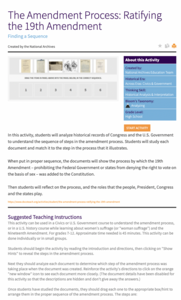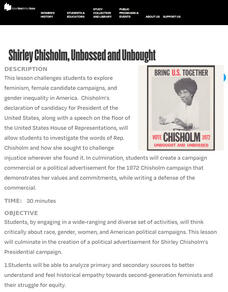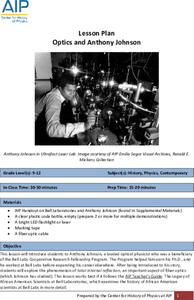Anti-Defamation League
Shirley Chisholm: Unbought, Unbossed and Unforgotten
A 13-page packet introduces high schoolers to a lady of amazing firsts. Shirley Chisholm was the first Black woman elected to Congress, the first Black woman to run for President of the United States, and a leader of the Women's Rights...
Center for Civic Education
Ronald Reagan and Executive Power
Article II of the United States Constitution grants Presidents executive powers in areas of international conflict, domestic and foreign policy. Using examples drawn from Ronald Reagan's presidency, class members are asked to consider...
DocsTeach
The Amendment Process: Ratifying the 19th Amendment
The process for adding an amendment to the U.S. Constitution is long and arduous, by design. High School historians study a series of documents about the Nineteenth Amendment and, using an interactive program, drag the documents onto a...
Anti-Defamation League
Women's Suffrage, Racism, and Intersectionality
The Nineteenth Amendment granted women the right to vote—as long as they were white. High schoolers read articles and essays about racism in the suffrage movement and consider how intersectionality played a role in the movement. Scholars...
PBS
Remembering Nelson Mandela
To learn more about Nelson Mandela, young historians watch a 20 minute video that traces his life from boyhood in a small South African village, to his work as an activist opposed to Apartheid, his imprisonment, and to his leadership as...
National Woman's History Museum
How Do We Remember and Honor the Contributions of Women in Public Space?
Public art, especially monuments and memorials, are designed to celebrate and honor those who have made significant contributions to a community or even an entire nation. Here's a lesson that asks scholars to consider who is represented...
National Woman's History Museum
Ida B. Wells: Suffragist and Anti-Lynching Activist
Suffragette, investigative journalist, and civil rights activist Ida B. Wells is the focus of a instructional activity that has young historians study the work of this amazing woman. Scholars watch a video biography of Wells, read the...
National Woman's History Museum
Real Life Rosie the Riveters
There was more than one Rosie the Riveter. To learn more about the contributions women made to the World War II war effort, groups become expert on different "Rosie" and share their findings in a Jigsaw activity. The lesson plan...
National Woman's History Museum
Shirley Chisholm, Unbossed and Unbought
An engaging resource introduces young historians to Shirley Chisholm, the woman, the Black congresswoman, the activist, and the candidate for President in 1972. Class members study primary sources, watch a video of her announcing her run...
American Institute of Physics
Women and the Manhattan Project
The Manhattan Project was a massive undertaking involving multiple sites and thousands of scientists and technicians. To gain an understanding of the women who participated in the project, groups select an oral history of a woman...
American Institute of Physics
Physicist Activist: Dr. Elmer Imes and the Civil Rights Case of Juliette Derricotte
Elmer Imes was not only a brilliant physicist but also a civil rights activist. After an introductory lecture, groups read two articles about a traffic accident that killed one Fisk University student and injured several others. The...
American Institute of Physics
The Physical Sciences at Historically Black Colleges and Universities
The history of science instruction at Historically Black Colleges and Universities (HBCUs) is the focus of a lesson that explores the early challenges these institutions faced in accessing equipment for their labs and instructors for...
American Institute of Physics
Optics and Anthony Johnson
Message sending has come a long way since the days of Morse code's dots and dashes. Young scientists study the research of optical physicist Anthony Johnson and his work in fiber optics, lasers, and the principle of total internal...
American Institute of Physics
The Tuskegee Weathermen: African-American Meteorologists during World War II
Chances are good that young scholars have heard of the Tuskegee Airmen but few would predict that these pilots had their own support in the form of the Tuskegee Weathermen. These Black meteorologists were recruited and trained to provide...
American Institute of Physics
Meet Four Pioneering African American Astronauts
An out-of-this-world resource introduces young scientists to four African American astronauts: Michael P. Anderson, Ronald E. McNair, Guion S. Bluford Jr., and Jeanette J. Epps. Groups read biographies of these individuals and prepare...
American Institute of Physics
Historical Detective: Edward Alexander Bouchet and the Washington-Du Bois Debate over African-American Education
Young scientists meet Edward Alexander Bouchet who, in 1876, was the first African American to receive a PhD in Physics. This two-part lesson first looks at the debate between Booker T. Washington and W.E.B. Du Bois about the type of...

















